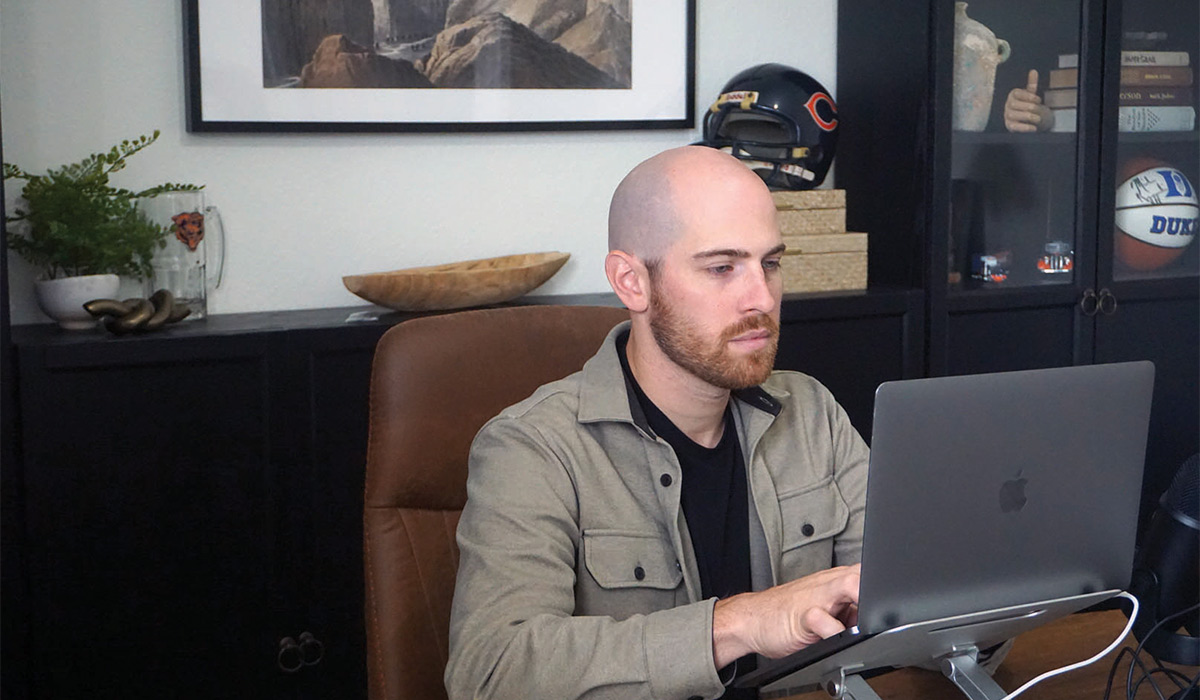
n online search for “Alaska marketing agencies” returns descriptions like “grow your local business,” “hundreds of satisfied clients in Alaska,” “the local go-to.” Local agencies tailor their services to the needs of local businesses, promising Alaska solutions for Alaska entrepreneurs.
The approach makes sense, according to the founders of Orange Slice, an Anchorage-based agency that builds marketing strategies for local clients like Mr. Prime Beef and Alaska Chip Company. “Alaska is unlike anywhere else and demands a unique approach to marketing strategies,” asserts the Orange Slice website.
But a handful of local marketing agencies have found success by doing less. While these agencies still offer an array of marketing services, they’ve each narrowed their client base to a single industry—and, by doing so, they have expanded beyond Alaska to find success throughout the Lower 48.
“We were terrified,” Christensen recalls. “Here we are, two women from Alaska going into—we now realize—what was a very, very competitive market. I wanted to stay local and serve small clients that I felt like were not being served well.”
But Wilkerson had confidence that Beacon could be successful on a larger scale. The founders decided that if they were going to put everything they had into expanding, they would focus on an industry they were both passionate about. Christensen had sought a degree in mental health earlier in her career, and Wilkerson came from the family that had established Alaska’s first Christian mental health practice. Therefore, putting all their energy into marketing to mental health and functional medicine seemed like a natural fit.
With a couple of Alaska-based mental health clients already on their roster, Christensen and Wilkerson took everything they had learned about digital marketing in Alaska and began courting clients in the Lower 48.
Within six months, Beacon had its first national accounts.
“We found that clients in the Lower 48 had a completely different mindset,” Christensen says. “We had people left and right in Alaska telling us that social media was a fad and, ‘Who even needs a website?’ It had been an uphill battle of education. Once we went national, our clients in the Lower 48 understood: of course you need digital marketing. Then it was just a case of, well, can you do it better than somebody else?”
They could. Once Beacon went national, Christensen recalls, “It was like we had done all the hard work here [in Alaska], and it really paid off.” Having found its niche, Beacon quickly began to grow.
Tyler Williams, too, discovered his niche as a result of timing. When the Fairbanks-based entrepreneur bought the company he would rename Mammoth Marketing in 2015, his brother was going into business for himself as a plumber. Williams took his brother’s business on as a client—and then helped him take the Fairbanks plumbing market by storm.
“We took him from nothing to a $5 million-plus company,” Williams says. “It worked really well. But then I started reflecting on my own business, and I was like, OK, we’ve got a team, we’ve got what we do well. Why don’t I just lean into the things we do well?”
At the time, Mammoth Marketing had lost a couple of clients to specialty marketing firms. Williams recalls, “I could feel the changing of the tide, where it’s like marketing is becoming more about what sector do you serve and less about your region.”
Concentrating on a single industry allows Williams and his staff to replicate what they had done for his brother’s business, then tailor it for other plumbers.
“By narrowing our focus, we got really good at marketing to that specific core demographic, which then meant that we could develop materials and have a library [of resources] now that we can pull from,” Williams says. “That includes everything from the messaging itself, the style of images, the style of branding.”
Of course, there are only so many plumbers in Fairbanks, and in Alaska. Williams kept leaning into his niche market, which allowed him to expand his business into the Lower 48. Today, he supports three clients in-state with his specialty business Mammoth for Plumbers; outside the state, he works with thirty-five to forty regular clients.
Slater Strategies

“We’ve grown 600 percent since we went national. If we had gone national as just a general agency, I don’t think we would’ve grown even 100 percent because it’s just such a competitive market,” says Christensen.
Beacon’s rapid growth sprouts from the company’s earned expertise in its niche field. “The advantage of going niche is that you start to see commonalities. What works for this mental health practice in New York, some of those things work for another mental health practice in Texas,” Christensen describes.
Though each client has their own needs, the commonalities between mental health practices that specialize in medication management or eye movement desensitization and reprocessing therapy make it possible for Beacon to duplicate services client to client.
“One of the biggest challenges I think that every business seems to come up against is, ‘How do I do this for more people with more predictability?’” says Williams.
He describes feeling “spread so thin” before marketing solely to plumbers; the quality of his service suffered, he says, because he was constantly having to become a subject matter expert in different industries. “By being a ‘master of none,’ I was seeing that some clients weren’t getting the awesome marketing I wanted to offer, and that didn’t feel fair. By making that pivot, the team became better, and our clients get better results, and they’re happier because of it, which means it’s easier for us to pick up more clients.”
Fluency with a specific market is what convinced Mitchell Slater that going niche would work.
“When I first shifted, I was so worried that if I changed my website, I would stop getting clients,” admits the Slater Strategies founder who, in 2017, began focusing on providing digital marketing for private and charter schools.
In fact, the opposite turned out to be true. Thanks to his familiarity with the education sector, Slater began taking on more clients through referrals.
“Schools are a lot like Alaskans; if you don’t know their language, you’re not going to be in the circle. Because I can show a potential client ten other schools I’m working with, because I know the market, that gives them confidence, and the referrals are a lot better,” Slater says.
Now potential clients from the education sector see that Slater works primarily with schools, so they gain confidence that he knows the industry. Slater likens this expertise within a niche to the way Chick-fil-A specializes in just one kind of sandwich.
“They don’t try and do burgers and hot dogs. They’re so popular because they just do a good chicken sandwich. That’s kind of what I feel like the [marketing] industry has gone to: people are looking for agencies who specialize in one thing.”
He’s not wrong. A 2023 survey of 210 marketing agencies in the Lower 48 by Databox found that 90 percent of those companies reported specializing by client industry in some form. That number was up from only 30 percent in 2022.
In Alaska, the tide hasn’t turned yet. Most of this state’s marketing agencies specialize by geography, not industry. They emphasize that their teams know Alaska, and they market their services to local clients. Although Beacon, Mammoth for Plumbers, and Slater Strategies risked losing local work by targeting a single industry, each agency created new opportunities as they scaled their specialized services into the Lower 48.

Mammoth for Plumbers has recently experienced an uptick in onboarding new clients, something Williams similarly attributes to the pandemic.
“COVID introduced a whole bunch of money into the economy that hit plumbers in a really good way,” he says. “You ended up with a ton of plumbers in the market because everybody was saying yes to home renovations and repair work. That money is now spent, so now you have all these plumbers in the market with less demand. They’re all trying to fight for a piece of the pie.”
Williams is already anticipating the next twist. “This won’t last forever,” he adds. “And when it ends, I’ll pivot to do what I need to do to get clients. But within the plumbing community, my profile has been raised, and that makes a difference.”
Thanks to the pandemic, virtual offices have become more common, and the ability to work remotely is a high priority for many employees. This trend, Williams says, makes hiring high-quality associates easier for him, regardless of where they live.
While there are plenty of good, qualified marketing specialists in Fairbanks, where he’s based, he points out that most of them are already happily employed.
“I don’t want to poach someone from a gig they love,” he says. “But there’s good people everywhere. By opening it up, I can find people who have great skills anywhere.”
He now employs eighteen staff, mostly in the Lower 48. To keep his employees connected, he uses a virtual office that allows coworkers to “knock” on a virtual door for a video chat or gather for online staff meetings.
For Slater, virtual meetings have increased his efficiency and cut down on travel. Now he can meet with clients, regardless of where they’re located, without having to drive for hours or spend money on flights. With clients located in Alaska, California, Colorado, Texas, Arizona, New Jersey, and elsewhere, Slater—who splits his time between Alaska and Florida—can tour the country from his computer, ensuring all his clients receive the personal touch.
The greatest advantage of marketing to a niche industry, though, according to Slater, is that he gets to follow his passion.
“Helping a roofing company get to build another roof—that’s just not what wakes me up in the morning,” he says. “But helping a school get at capacity, to be able to pay their teachers more, give a student an education and a foundation that will get them to that next level—I’m more excited about getting involved in that.”